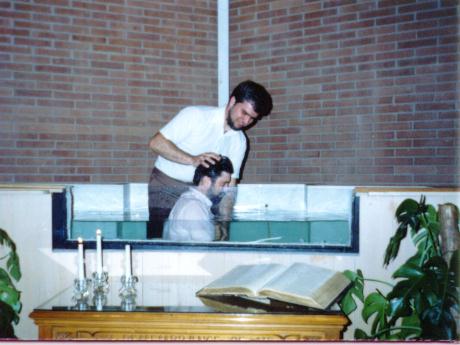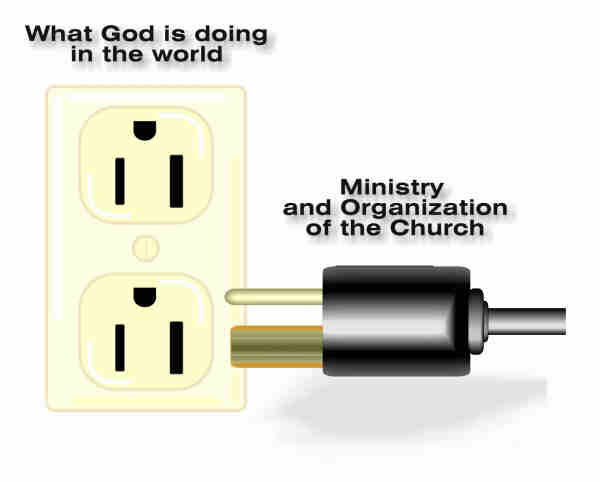
(Matthew 16:13-23)
May these words of this Peter be like a rock,
not a stumbling block!
|
|
"Who do you say
that I am?" Jesus asked. Simon Peter answered, "You
are the Messiah, the Son of the living God." And Jesus
answered, "Blessed are you, Simon son of Jonah! ... You are
Peter (petros), and on this rock (petra)
I will build my church..." Jesus then began to speak of
the rough road ahead. And Peter took him aside and rebuked him... "Get
behind me, Satan!" Jesus replied. "You are a stumbling
block..." (Matthew 16:13-23) May these words of this Peter be like a rock, |
"Making the Connection"
Message preached January 12, 2003
Long Green Valley Church of the Brethren
Glen Arm, Maryland USA
based upon Acts
19:1-7
Our family
finally entered the cell phone generation this week. For the longest time I wasnít
sure that was something I wanted to do. Theyíre not cheap, to start with. The
service we bought into is about as basic as you can get, a pay-as-you-go  plan
that provides us with a phone for on-the-road emergency purposes - emphasis upon
the word "emergency." I see too many people out on the highway gabbing
away while they weave in and out of traffic. Donít tell me itís not a
hazard.
plan
that provides us with a phone for on-the-road emergency purposes - emphasis upon
the word "emergency." I see too many people out on the highway gabbing
away while they weave in and out of traffic. Donít tell me itís not a
hazard.
My reluctance to take this step wasnít because of the alleged cancer risk of holding a cell phone next to your brain - though that does make you wonder... Beyond the cost of it all, though, my real reservation has had to do with being so "connected" that you can be reached anywhere, anytime (as long as youíre within range of a cell tower, that is). Is it a good thing to be that available? Is it right to be able to make a connection whenever, wherever you want (provided, of course, that the cell phone is turned on)?
Now, I donít really want to talk about cell phones this morning - but I do wonder if we arenít so very "connected" in some ways, yet so very "disconnected" in others. We can talk with people whenever we want, but what is one of the #1 problems too many of us face in this day and age? ... Loneliness... Makes you think, doesnít it! The English word "connection," "to connect," goes back to the Latin word "connectere," which literally means "to bind." It seems strange, doesnít it, to be so "connected" in our society, but to feel so "unbound," so "disconnected."
Wait a
minute. We are "bound," but maybe itís not to the right things.  Weíre
"bound," for instance, to that contract we signed to get our cell
phone. Weíre "bound" to all those fine-line details few of us really
read. Weíre "bound" to pay the bills. If we donít there will be
consequences. What seems so very curious about modern day life is that we
"bind" ourselves in so many different ways, but the ties that truly
connect us seem so very fragile. It is often by only a thin thread that we are
connected to what really matters.
Weíre
"bound," for instance, to that contract we signed to get our cell
phone. Weíre "bound" to all those fine-line details few of us really
read. Weíre "bound" to pay the bills. If we donít there will be
consequences. What seems so very curious about modern day life is that we
"bind" ourselves in so many different ways, but the ties that truly
connect us seem so very fragile. It is often by only a thin thread that we are
connected to what really matters.
No, my topic today is not cell phones, itís baptism. Baptism, at its core, is about "binding and loosing." Jesus said, "whatever you bind on earth will be bound in heaven, and whatever you loose on earth will be loosed in heaven" (Matthew 18:18). He was talking about covenant relationships between believers at the time, and what to do when a "connection" between two brothers in the faith is threatened by an ill-conceived action of one toward the other. "Work at this connection," was his basic teaching. Donít just hang it up. Talk about the problem, one on one, and if that doesnít work keep widening the circle of believers. Bring others in to help, step-by-step. If all else fails, conscientiously untie the connection and start all over again. In other words, recognize the disconnection that already exists, that a covenant relationship is broken, and seek to remake the connection.
"Whatever
you bind on earth will be bound in heaven, and whatever you loose on earth will
be loosed in heaven." Those words draw us back to baptism - that point
in time when we are bound not just to one another, but to God in Christ
Jesus. In the larger Christian church we may differ as to when and where a personal
decision enters into the matter. Our particular "take" on baptism, as
Brethren, is that this binding requires a conscious step on the part of
each person. Baptism is an adult choice, we believe, not a decision made by
others for us. However, even those churches which practice infant baptism
recognize the need for choice, and they provide an opportunity for each person
at a later point in life to confirm their baptism as an infant, to
"connect" of their own free will, to choose to be bound to Christ and
his church.
In the larger Christian church we may differ as to when and where a personal
decision enters into the matter. Our particular "take" on baptism, as
Brethren, is that this binding requires a conscious step on the part of
each person. Baptism is an adult choice, we believe, not a decision made by
others for us. However, even those churches which practice infant baptism
recognize the need for choice, and they provide an opportunity for each person
at a later point in life to confirm their baptism as an infant, to
"connect" of their own free will, to choose to be bound to Christ and
his church.
When people came to John the Baptist long ago as he preached fire beside the Jordan river, they were aware of a disconnection in their lives. They knew something wasnít right. Oh, Iím sure that for some people John, in his weird outfit and interesting diet, was a first century form of entertainment. "Letís go and see what the Baptist is doing today." However, for those who eventually stepped into the water and were immersed by this prophet, Johnís wordís connected with what they knew in their gut was true. All was not peaches and cream in the land of milk and honey.
"Repent," he cried, and they turned and, like a washerwoman, John scrubbed away at the grime of their sin - the crud that was disconnecting them from God. Only, it wasnít an outside job. It wasnít the skin that was getting moisturized. It was the human heart, full of the pollution that comes from living a life disconnected from God, that was getting washed. Of course, John wasnít like some Mayan priest literally pulling the heart out of a human sacrifice. He merely dunked each person, body and all, beneath the surface of the river. Repentance led to forgiveness.
In the story as weíve received it, however, John himself recognized that this was only the first step in a larger process. "I have baptized you with water," he said, but "the one who is more powerful than I is coming after me; the one whose sandals I am not worthy to untie. He will baptize you with the Holy Spirit" (Mark 1:7-8). Johnís baptism was about repentance, about turning away from sin and toward God. The baptism of the one John considered "more powerful than I" would be about infinitely more.
We have
another story from the book of Acts which juxtaposes the baptism of John over
against "baptism in Jesusí name." It happened in the city of
Ephesus, on the west coast of modern day Turkey .
On his journey spreading the good new of Jesus, the apostle Paul traveled there
with two co-workers in the faith, a woman preacher by the name of Priscilla, and
her husband Aquila. After a brief visit, he left them in Ephesus to do the Lordís
work there while he continued onward (Acts 18:18-21). In
Paulís absence, another traveling evangelist stopped by this seaport city and
made quite a stir.
.
On his journey spreading the good new of Jesus, the apostle Paul traveled there
with two co-workers in the faith, a woman preacher by the name of Priscilla, and
her husband Aquila. After a brief visit, he left them in Ephesus to do the Lordís
work there while he continued onward (Acts 18:18-21). In
Paulís absence, another traveling evangelist stopped by this seaport city and
made quite a stir.
This is the first view weíre given of a fellow by the name of Apollos. We read more of Paul in the Bible than we do of Apollos, but this man was just as influential in the early church. Only at first, according to the book of Acts, Apollos didnít quite make a crucial connection. "He had been instructed in the Way of the Lord, and he spoke with burning enthusiasm and taught accurately the things concerning Jesus." However, Apollos, it says, "knew only the baptism of John" (Acts 18:25). He didnít quite catch that Johnís baptism was just a first step. Priscilla and Aquila helped him to make the connection, and he went on to a significant itinerant ministry.
When Paul later returned to Ephesus, he encountered some disciples there who, perhaps, had turned to Christ having heard Apollos preach before this connection was made. These believers also only knew about Johnís baptism. Paul helped them to make the connection and, it says, they were then baptized in Jesusí name. What was the connection Priscilla and Aquila helped Apollos to make? What was the connection Paul helped these disciples to make?
Well, Johnís baptism, as I said, was about repentance, about turning from sin. Thatís a very important step that needs to made in our life of faith. However, baptism in Jesusí name takes this step much further. You see, itís one thing to recognize that something is not right, that itís not all peaches and cream in the land of milk and honey. That inner awareness is what prods us to turn from that which we know deep down is not what God wants for us, or of us. A frustrating aspect to baptism that is only about repentance, though, is that weíre left wondering, "what now?" We turn, and thereís that sense of forgiveness that comes with facing in the right direction, but we are left incomplete without the making of a crucial connection.
When we are baptized in Jesusí name, we are connected up, we are tied, weíre bound (if you will) to the source of our strength. We are plugged into an inexhaustible power that helps us to follow him. Without it, without the Holy Spirit, we can turn, but we havenít got the gas to go, so to speak. Baptism is about making this connection. Those disciples in Ephesus had never heard of the Holy Spirit, but once these 12 disciples (gee, I wonder if that number has any significance?!) made the connection, once they received the strength that God intended them to have, they became the nucleus of the church God was growing right there in Ephesus.
Are you
making
 the
connection? Baptism is about our covenant relationship with God, the One to whom
we turn when we turn from our sin. The Lord binds us to Christ and his church.
As Ken Medema sings, "we are bound together and finely woven with
love." That which ties us to God in Christ and to one another is not the
rope
the
connection? Baptism is about our covenant relationship with God, the One to whom
we turn when we turn from our sin. The Lord binds us to Christ and his church.
As Ken Medema sings, "we are bound together and finely woven with
love." That which ties us to God in Christ and to one another is not the
rope of a noose placed around our neck. Nor is it a chain that enslaves us. It is a
spiritual bond, the very presence of God - the Holy Spirit. Think of it as a
power cord.
of a noose placed around our neck. Nor is it a chain that enslaves us. It is a
spiritual bond, the very presence of God - the Holy Spirit. Think of it as a
power cord.
Now, let warn you, this connection binds us stronger than any contract ever could. As we live out our baptism, we are called to make the connection between our faith and our daily life. What gets baptized is not just who we are when we walk through the doors of our meeting place. No. Our entire body, our entire life gets dunked. Weíre talking 24/7 here, folks. Call it "extreme faith." Not "extremist" faith, mind you. Not "fanatic" faith, but a faith that works out to all the edges of our life. There is no part of our life that gets excluded. Are you making the connection?
You know, I started this message talking about a cell phone, wondering if I really wanted to be that connected. Well, in this regard, baptism goes far beyond a cell phone. Think about it. We are connected 24/7 to God through his Spirit. Oh, I suppose we can decide to turn it off. Thatís always a choice. Unfortunately, too many of us do. However, for those who choose to make the connection every day, everywhere - to live out their baptism - the good news is that there is no place we can go that God is not. His "cell" plan, if you will, has unlimited coverage.
So, let me ask one last time - are you making the connection?
| online resources for this scripture text |
For commentaries consulted, see Acts. |
©2003 Peter L. Haynes